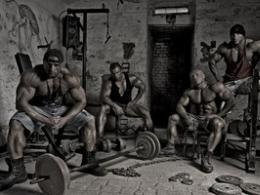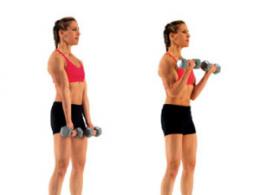What is protein and why does the body need it? Protein, what is it for? Weight gain. The difference between protein and gainer Protein - what is it for?
Do not be afraid! Protein is just protein!
Protein is not “chemistry” or “steroids”. It is enough to turn to the Russian-English dictionary, and it will become clear that translated from English “protein” is simply “protein”! And protein, in turn, is an organic compound consisting of amino acids. In the human body, protein plays a very important role and performs many functions:
- Construction (structural): protein is the building material of all structures of the body (from cell membranes to muscles and ligaments)
- Energy: during splitting, the energy necessary for the body’s vital processes is released (1 g of protein - 17.2 kJ of energy)
- Signal
- Contractive
- Reserve (storage)
- Transport (gas exchange)
- Regulatory
- Catalytic
- Protective (antibodies)
- Hormonal
As we see, without protein (protein), not a single cell, and therefore the organism as a whole, can fully exist. And we can replenish its reserves from the outside. What are the sources of protein? You might be interested.
What is protein made from?
Protein of animal and plant origin is isolated. The former include protein found in poultry, meat, fish and seafood, eggs and dairy products (this type of protein can be classified as “intermediate”; this will be especially important for vegetarians who allow dairy products into their diet). Vegetable proteins include proteins obtained from legumes, mushrooms, and cereals (it is worth noting that almost any cereal contains a small amount of protein).
So how do proteins obtained from different foods differ? Firstly, the amino acid composition: proteins of animal origin have a more “rich” composition and contain more essential (that is, not synthesized by the body) amino acids than proteins obtained from plants. Secondly, animal and milk protein is absorbed better and faster than plant protein, which means there are more benefits from it.
Why do you drink protein?
Protein in the form of protein mixtures and protein bars is consumed not only by athletes, but also by people whose diet, for one reason or another, lacks protein. In bodybuilding, it is often used to increase muscle mass. Along with carbohydrates, to create new muscle fibers we need a “building material” - protein. When the goal is a significant increase in muscle volume, the amount of protein required becomes quite large, and it is not always possible to eat such a volume in a day. In this case, protein shakes come to the rescue. In addition to being easy to consume, protein powders require less time to digest because... amino acids are contained in it practically in a split form. Therefore, a protein shake will be an excellent option for recovery after a workout, as well as immediately after waking up. In addition, the “fast food” entering the body will prevent the action of the stress hormone - cortisol, which is produced both during training and during sleep - thereby we will prevent catabolic (destructive) processes.
What types of protein mixtures are there?
As we have already found out, protein (protein) can be of animal and plant origin. Protein mixtures and other sports supplements based on them also contain different types of protein. You can buy protein:
Most Popular
- Whey - made from whey. Absorbed quickly due to the high degree of breakdown into amino acids.
- Casein - also made from milk, but takes longer to digest, so it can be used as a food additive before bed. It will provide an even amino acid background for 6-8 hours. Casein is found in cottage cheese.
- Soy is a quickly digestible, balanced form.
- Multicomponent - may contain several types of protein. It is good because it performs several functions: rapid and gradual saturation of the body with amino acids.
Less popular
- Beef has a specific taste. It takes a long time to digest (can be used as an analogue of casein).
- Egg is a quickly and fully digestible type.
Protein mixtures differ in amino acid composition, degree of processing, quantity and quality of carbohydrates (for example, a gainer is predominantly a carbohydrate mixture), flavor and vitamin additives, and other nuances. Protein shakes are made with both water and milk.
You must remember that protein supplements should not make up more than 30% of your protein intake.
Is protein dangerous?
Perhaps the only danger that protein poses is an individual intolerance to a particular type of protein or an allergy. If you are allergic to milk, you will most likely have to stop consuming casein. If you are allergic to lactose - milk sugar - you will have to replace whey protein with isolate (it does not contain lactose).
Also, people who have kidney problems should not abuse any type of protein. A healthy body will be able to remove even excess protein (although you need to try very hard to cope with such a dose of protein).
Every athlete should know about the important role of protein in the body. Athletes who engage in strength training need protein to a greater extent than those for whom physical activity is not as important.
So what is protein for? It's simple - without it you can't build muscle.
What is protein?
What is protein? Everything is simple here too. Protein is concentrated protein. And that’s it, no unnecessary additives or properties (with the exception of gainer – it contains carbohydrates). But its contribution to the body is invaluable. It is known that the human body is on average 70% water, so you need to drink at least two liters of water a day. The second largest protein is protein; the body uses it to build all the tissues of the body. It is obvious that without a sufficient amount of protein, normal functioning of the body is impossible:
- Protein provides essential amino acids that are involved in building muscle tissue;
- Promotes stable insulin levels in the body;
- Supports the immune system and the necessary level of energy, health and beauty of the body.
The word “protein” is translated from English as “protein”. Let's see what the famous Wikipedia writes about squirrels:
“Proteins (proteins, polypeptides) are high-molecular organic substances consisting of alpha amino acids connected in a chain by a peptide bond. In living organisms, the amino acid composition of proteins is determined by the genetic code; in most cases, 20 standard amino acids are used during synthesis. Their many combinations create protein molecules with a wide variety of properties. In addition, amino acid residues within a protein are often subject to post-translational modifications, which can occur both before the protein begins to perform its function and during its “work” in the cell. Often in living organisms several molecules of different proteins form complex complexes, for example, the photosynthetic complex.”
How to use?
We can get protein practically from food (meat, eggs, fish, cottage cheese), but they cannot always provide the required amount. A person who does not burden himself with physical activity can easily get by with a normal diet; the rate of protein consumption per day for him is calculated as follows - 1 g of protein per 1 kg of weight. The situation is different for athletes, especially those who want to build muscle mass. For them, the protein consumption rate is 2-4 g per 1 kg of weight. It is very difficult to obtain such an amount from food. For example, a 100 g pack of cottage cheese contains 16 g of protein; an athlete weighing 80 kg needs at least 160 g of protein per day, which is 8-11 packs of cottage cheese (100 g each) every day. It is impossible to consume so much cottage cheese, or eggs or chicken fillet per day. Therefore, it is especially important for athletes to consume protein in supplement form. Easy, safe, effective!
Master muscle builder
Protein is the main muscle builder; without it, the growth and restoration of muscle fibers after active training is impossible. The more intense the workout, the more significant it is for building muscle tissue. If an athlete wants to lose weight, but at the same time maintain muscle mass, he simply needs to consume protein, since a low-calorie diet does not contribute to sufficient protein intake. You can't do without protein! The main thing is to choose for yourself the required quantity and, importantly, good quality. Excellent physical shape and well-being are guaranteed!
Everyone has heard at least once about sports nutrition, in particular about protein supplements. But not everyone knows what protein is for. First of all, bodybuilders need them, because it is thanks to protein that muscle tissue grows, not to mention its other vital functions. How does it differ from regular protein foods and is it necessary to drink it?
There are two significant advantages of protein powder over natural food:
- Its convenience - when you can’t cook, have a snack, or simply don’t want to eat... it means you need protein. After all, it will be absorbed faster than solid food, and the palette of various tastes will surprise any picky eater.
- There is no ordinary protein food that can be digested in 20-30 minutes. And protein powders are made in such a way that, after consumption, they are able to immediately provide all the necessary amino acids included in their composition. This is exactly what whey protein, also called “fast”, does.
- In addition, these supplements contain other components that also promote rapid recovery and growth after intense training, such as creatine and essential amino acids BCAA. For example, to get 5 grams of creatine (serving), you would need to eat 1 kg of beef... talk about convenience!
Why then do girls need protein? Yes, all for the same reasons! It makes no difference whether a man or a woman takes it. Unlike anabolic steroids, which act at the hormonal level, protein has its effect absolutely equally for everyone and cannot cause any harm (except for its excess).
Do you need protein when losing weight? Absolutely yes! But it is better to opt for BCAA, because some proteins contain a lot of carbohydrates and fats.
Protein is needed to prevent muscle breakdown
It provides us with a variety of amino acids, each with its own specific purpose for maintaining excellent health. Of all these goals, repairing and building new muscle tissue is the most important. By not consuming enough protein, you undermine your physical condition. Read more about how much you need to take it.
Protein also helps maintain nitrogen balance (or positive nitrogen balance), a process that ensures muscle preservation. If you go on a diet to lose weight, then your need for proteins will increase significantly, since you will have to partially give up carbohydrates - rice, pasta and bread. You will find special benefit and salvation in a protein supplement if, among other things, you do not consume enough regular protein foods.
Protein is needed for speed recovery
Numerous studies have shown that protein synthesis is increased when protein is taken before and after exercise. Before training, it will help protect muscles during grueling strength exercises, and afterward, it will spur the process of recovery and creation of new muscle fibers.
Required for strong bones
Many people do not get enough calcium for various reasons: some do not attach importance to it, while others have difficulty digesting dairy products. But it is he who makes bones strong and plays an important role in muscle contractions. That's what protein is for, one scoop of which contains 20% of the daily value of calcium. If you drink a protein shake before and after strength training, you are already getting almost half of your daily calcium intake.
Necessary for vegetarians
Vegetarians sometimes find it very difficult to get the required portions of complete protein from grains, fruits, vegetables and nuts. Today on the sports nutrition market you can find many alternatives in the form of soy, egg and even hemp protein. These supplements make life much easier for vegetarians and make their workouts more effective.
Just convenience
Planning your diet and further cooking is a very routine and tedious task, but very necessary. There are those who do not have the time or ability to plan their diet for the week and, as a result, run to McDuck or other “unhealthy” establishments. This is what you need protein and protein mixtures for - throw a couple of spoons into a mixer, add milk, add a banana and beat. A balanced food source of carbohydrates, proteins and fats is provided.
Protein should be at the top of your sports nutrition list, which is why it is a fundamental supplement - the basis of any successful diet and training program.
Many people believe that taking protein is only necessary when building muscle mass. However, recent research conducted in this area shows that this is far from the case. Protein takes an active part in the construction of not only muscles, but also all organs of our body. Its deficiency causes the accumulation of fat mass, the body does not receive the required amount of building material, hair becomes brittle and skin flabby. Therefore, today many girls prefer to lose weight with the help of protein. Read below about how to take it correctly, what types of protein are known, and how they differ.
Benefits of Protein
Today protein is available in several variations: powder, shakes, bars. If you want to lose a few kilograms and not feel hungry, then this product is a must-have for you. However, just lying on the bed and drinking a protein shake will not give you beautiful shape.
So, protein not only helps to form muscles, but also defeats hunger without harming your figure, accelerates metabolic processes and is involved in the process of destroying fat. After all, to digest protein, the body requires much more energy than what is contained in it, so the body begins to break down fats, while receiving the missing calories, which leads to a decrease in volume.
Eating protein while losing weight will relieve you of sagging skin and split ends. Protein also affects the breakdown of carbohydrates by controlling the glycemic index.
Protein harm

Some people are quite wary of sports nutrition and protein in particular. Questioning the benefits of its use. Attributing some negative qualities to protein: a negative effect on potency, kidneys, and liver. However, studies have shown that pure protein does not have any destructive effect on the body. On the contrary, it restores the functioning of organs, sponsoring the body with building material.
The exception is people who have individual protein intolerance, but this is a fairly small group, and if you are not part of it, you can take protein at any age. The main thing is to pay attention to the rules for using the product. After all, depending on your goals, your protein intake schedule will differ.
Protein for weight loss

It should be used very carefully. They can replace one or more meals. After all, after drinking 200 ml of the drink, you will not feel hungry for 3-4 hours. When losing extra pounds, you should never drink protein during meals. This may have the opposite effect. If you have had a snack, wait 45-55 minutes before taking protein.
Are there any other reasons to consume protein while losing weight? Of course have.
If you are on a diet, you naturally reduce the amount of food you consume, which can lead to a lack of protein, and the body begins to borrow it from the muscles, which leads to their sagging, nails begin to peel, hair splits and breaks, and the skeletal system becomes thinner.
The low caloric content of proteins and high energy costs for its processing lead to a significant reduction in fat mass. After all, the body will borrow a lack of calories from existing fat reserves.
The best time to consume proteins for the purpose of losing weight is 1.5-2 hours before the start of a workout, preferably if it is active aerobic exercise.
If you stay somewhere during the day, then without harm to your appearance and health, you can have a snack with a protein bar, washing it down with enough water.
Today there is a wide range of this product on sale. You can choose a dessert to suit every taste. Below we will talk about the types of protein, so when choosing a bar or any other protein product, pay attention to the type of protein used. The cost of the dessert depends on this.
Types of protein

Today, several types of protein are produced, each of them differs in its properties and degree of purification:
- The most affordable is plant-based soy protein. It is often used to produce inexpensive candy bars that are consumed as snacks.
- Casein protein is made from fermented milk; it saturates the body for a longer time than the previous one.
- By purifying animal protein, whey concentrate is obtained; it is quite popular among people who want to lose extra pounds forever because of its low cost. However, the percentage of digestible product in it is no more than 62-63%.
- Highly purified protein is obtained during the production of whey isolate. Thanks to high-tech processes, the amount of digestible protein reaches more than 96%, while the amount of lactose in it is minimal.
- The purest and most digestible protein is whey hydrolysate. This is a new type of protein that is maximally absorbed and saturates the body. The fairly high cost is its only negative factor.
How to take protein

Before answering the question, you should determine the reason for consuming protein. If your goal is to drink protein after training, especially strength training. But if you want to lose weight, then you can replace any meal with the prepared cocktail or drink a glass 1.5-2 hours before the start of your workout. Try to do more, this direction in combination with protein will help you get rid of extra pounds in a short time.
Don't be afraid that replacing dinner with a protein shake, for example, will leave you hungry. The protein contained in the drink will sufficiently saturate your body without ruining your figure.
In addition, the cocktail has a low calorie content, despite its wonderful creamy taste with numerous shades.
The general principle of losing weight with protein is as follows. The body simply needs carbohydrates to produce energy, and it is to them that it first turns for support. By replacing breakfast or dinner with a protein shake, you not only reduce the calorie content of your meals, but also dramatically reduce the amount of carbohydrates in your diet. With a lack of the latter, the body, not receiving enough energy, begins to take it from fat reserves. Consequently, the fat layer becomes thinner and disappears. However, this is only possible if you include cardio training in your schedule. Otherwise, the body has no reason to release extra calories.
Most importantly, do not forget one important principle. At one time, your body can absorb about 40 g of protein. Therefore, you should not consume large portions at a time. It's better to break them up into several steps. Drink the last portion of the cocktail no later than 2.5 hours before bedtime.
Where is protein found?

You can saturate your body with protein not only by consuming special cocktails and bars. A lot of protein is found in everyday foods. Animal protein is found in meat, fish, poultry, and eggs. In addition to the animal component, you can supplement your diet with vegetable proteins, such as peas, soybeans, asparagus, lentils, and beans.
How to make a protein shake

You can prepare a drink not only using expensive special powders. At home, you can make a protein drink using a blender, whisking all the ingredients in it quite vigorously. Here are a few such recipes:
- 360 ml of low-fat milk, 125 g of natural yoghurt, some fresh strawberries and a spoonful of flaxseed;
- 260 ml of milk, 1 spoon of honey, banana, some ground oatmeal and natural yogurt;
- 300 ml of milk, banana, 150 g of cottage cheese, 2 spoons of oatmeal, a spoon of honey;
- 200 ml milk, banana, a pinch of cinnamon and honey;
- 200 ml milk, banana, 1 egg white, 60 g cottage cheese, a little fruit syrup.
And one more little tip. If the banana is frozen before use, the smoothie will be thicker. Give preference to natural products. If you buy powder in a store, pay attention to the ingredients included in it.
A single serving of the drink should not exceed 260-310 g. This is quite enough to suppress your appetite for more than 3 hours.
Protein is the most popular sports nutrition in the world. Like everything popular, protein intake is surrounded by many myths. Starting from impotence when taking protein, to “protein is nutrition for jocks.” In our article we will tell you what protein is, what foods it is found in and why it is needed. We’ll also talk about the benefits and harms of protein, and how much protein is absorbed at one time.
What is protein?
Protein or protein (colloquially) is an organic compound consisting of amino acids. Under the name protein you can combine all amino acids, proteins, caseins, isolates - all of this is either a protein or its components. Protein consists of 21 amino acids, and only 8 of them the body is not able to synthesize on its own; they are essential. For example, it represents only 3 essential amino acids: leucine, isoleucine, valine. We wrote about the features of bcaa and the need for use in.
The benefits of protein
Almost everything in our body consists of proteins: organs, muscles, hair, nails, skin, brain. The role of protein in human life is clear without further explanation.
What is protein responsible for in the human body?
- Immunity. Antibodies that protect the body from infections are proteins.
- Construction material. Protein is the building block of the body.
- Energy. 1 gram of protein yields 4 kcal, but they are used when carbohydrate reserves are depleted.
- Transportation. Hemoglobin, so important for athletes, is also a protein.
- Exchange processes. Without proteins, not a single process occurs in the body.
Possible harm from protein
There are studies that indicate the dangers of a high-protein diet. This creates an increased load on the kidneys and liver, and there is a risk of dehydration. But all these side effects are associated with huge doses of protein (more than 5g per kg of body weight). Risks can be reduced by eating both plant and animal proteins and drinking enough fluids on a high-protein diet.
High doses of protein are no more harmful than high doses of fat or carbohydrates, but neither of these will be beneficial. All the horror stories regarding proteins have no basis, especially the rumors about impotence. Such problems have never arisen from meat, milk, and cottage cheese, but suddenly they have arisen from protein. This comes from the field of bodybuilding, where in addition to protein, more serious and harmful drugs are used. They have exactly these side effects, but they don’t talk about taking them, and ordinary people see only the protein. Protein, like meat, milk and other protein products, on the contrary, has a positive effect on all processes in the body, including reproductive functions.
List of foods that contain protein
You can meet your protein needs from proteins of plant and animal origin. If animal protein is complete, then plant protein does not have a complete amino acid composition. Therefore, vegetarians and vegans need to properly balance their diet and consume protein mixtures.
Below we have compiled lists of the most protein-rich foods. This does not mean that you need to eat only them, but most of the protein should come from them.
Animal protein: product list
- Chicken. 20 g per 100 g Healthy and affordable product with low fat content. The most useful part is the breasts. Can be used in any form.
- red fish. 22 g per 100 g A little more protein than chicken, but also higher fat content. Fat is extremely healthy (omega-3). The price is not affordable for everyone for regular use, but you should not forget about this product.
- Beef. 19 g per 100 g A well-known source of protein with low fat content. Beef steak is the food of any athlete.
- Cheese. 25 g per 100 g Due to its high fat content, this product is far from being among the leaders in sports diets. But don't forget to occasionally sprinkle some cheese on your pasta or season your chicken breast.
- Cottage cheese. 17 g per 100 g The best source of casein, a slow-digesting protein. We recommend using it at night and writing in long intervals between doses. Satiety and muscle nutrition are guaranteed.
- Milk and kefir. 3 g per 100 g Milk is the source of the most rapidly digestible protein. Not suitable as a stand-alone source, but ideal for omelettes and protein shakes.
What foods contain vegetable protein? Grocery list
- Quinoa grains. The most balanced plant protein. The amino acid composition is close to dairy products, and the protein content is 16 g per 100 g of product. Not the highest content, but the richest amino acid composition.
- Chia seeds. Protein content – 20 g per 100 g of product. In addition, they contain more calcium than dairy products. Recommended for vegans and vegetarians!
- Peanut paste. Protein 25 g per 100 g There are several disadvantages: high calorie content and a lot of fat. Although this fat is healthy, it is still not recommended for those who count calories. But for marathon runners, skiers, and swimmers, this is an excellent snack.
- Chickpeas. Lots of healthy vitamins and minerals, plus 19 g of protein per 100 g of product.
- Peanut. More than 20 g of protein per 100 g. Tasty and healthy.
- Lentils and beans. Contains 17-23 g of protein per 100 g depending on the variety

How much protein is absorbed in one meal?
There has long been information among athletes that there is no point in consuming more than 30 g of protein at a time. Allegedly, everything that is above will not be assimilated. Is it so? How much protein can our body actually absorb in one meal?
If a person does not absorb more than 30 g of protein, then how do people who eat 3 times a day survive? And these are the majority, especially those engaged in heavy physical labor. Based on this theory, the body receives no more than 90 g of protein in 3 times. Moreover, this is in the best case and with a balanced diet. The protein norm for high physical activity is at least 1.5 g per 1 kg of body weight. In this case, there would be a constant deficiency of protein and the problems arising from it.
If this were so, then humanity could have disappeared long ago. Our body is a complex system, much more complex than it seems at first glance. The digestion process is a whole chain of chemical reactions that are regulated by special hormones. Digestion can be artificially slowed down by the body in order to absorb as many nutrients as possible. Therefore, a person who consumes 120 g of protein at a time and takes 4 times 30 g each will receive the same amount of protein. Both will survive and both will be healthy. The first will have one long digestion, the second will have 4 short ones.
Of course, it is better to split up your meals, not to overeat and not to overload the digestive system. But you took 50 g of protein or 25 g - there is no difference for the body, the main thing is that you took it.
Eat right and be healthy :) If you have anything to add or object to, write in the comments and we’ll discuss it.






